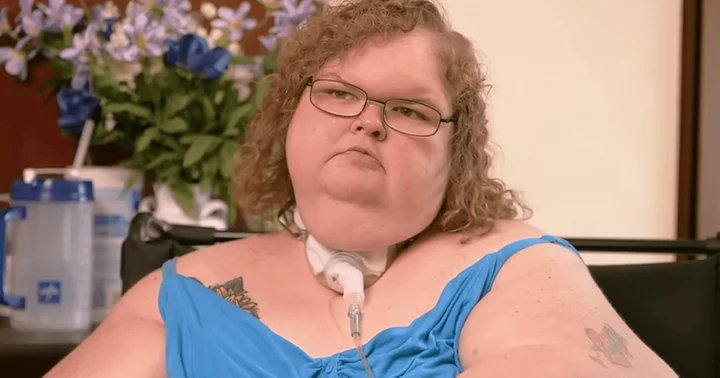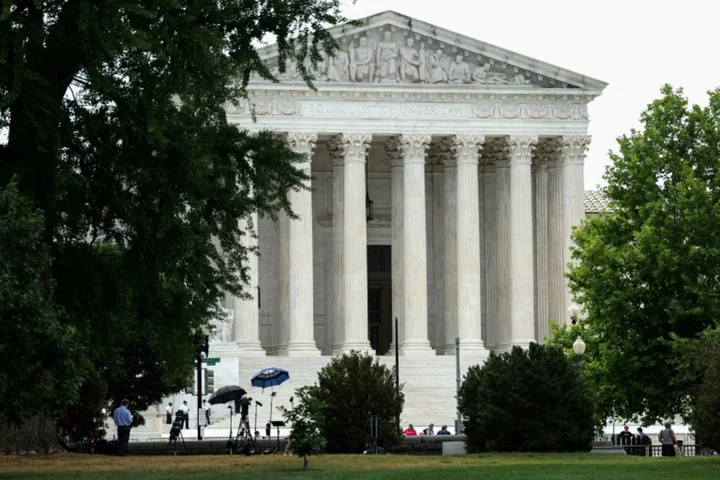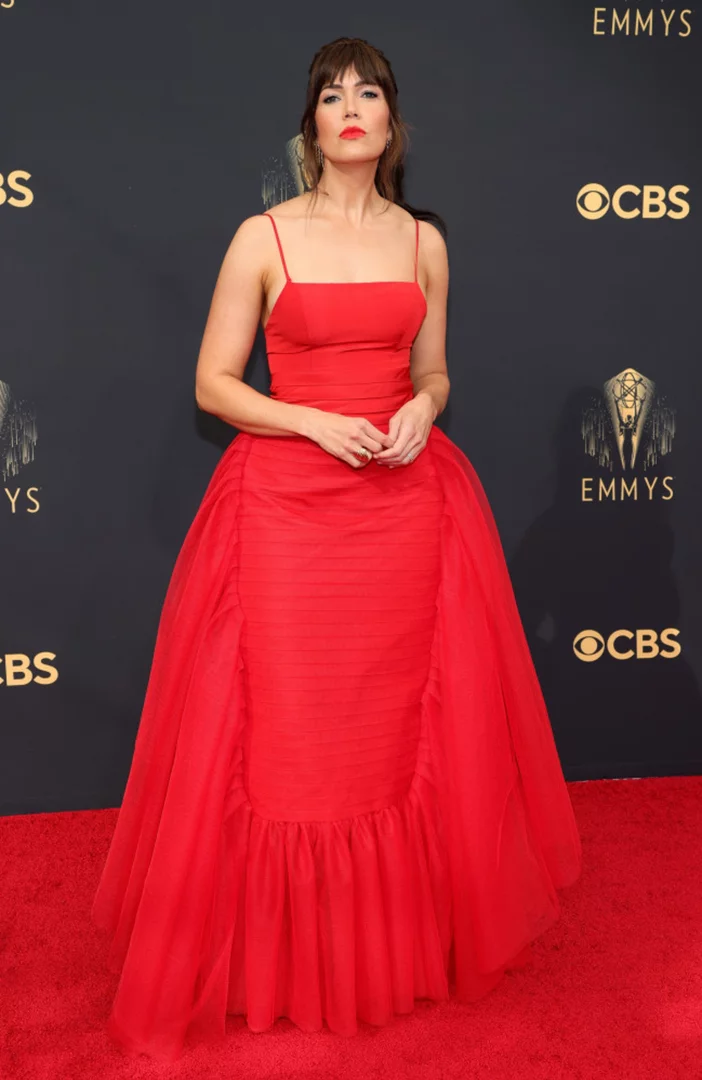It's official: The House of Usher has fallen at last.
The finale of Mike Flanagan's The Fall of the House of Usher saw the inevitable deaths of the last members of the Usher clan, and answered our most burning questions about the season along the way. How did Roderick and Madeline Usher (Bruce Greenwood and Mary McDonnell) gain control of Fortunato Pharmaceuticals? What murder was Roderick going to confess to attorney Auguste Dupin (Carl Lumbly)? And why has the mysterious figure of Verna (Carla Gugino) been killing Usher after Usher?
The answers to all these questions link back to one very fateful night in Usher history: New Year's Eve, 1979. As Roderick finally tells Dupin what happened all those years ago, the last pieces of The Fall of the House of Usher's diabolical puzzle fall into place. So let's take a trip down memory lane and break down the House of Usher's final moments.
SEE ALSO: 'The Fall of the House of Usher' review: 'Succession' meets Edgar Allan Poe in brilliant horror seriesThe Fall of the House of Usher goes full "Cask of Amontillado."
Carl Lumbly and Bruce Greenwood in "The Call of the House of Usher." Credit: Eike Schroter/NetflixThe Fall of the House of Usher pays tribute to Edgar Allan Poe throughout, and the finale — aptly titled "The Raven" in reference to his most well-known poem — is no different. A key sequence is ripped straight from the pages of another famed Poe work: short story "The Cask of Amontillado."
In that 1846 story, narrator Montresor commits a most unconventional murder. He lures rival nobleman Fortunato into his wine cellar with the promise of a cask of Amontillado wine, only to chain him up and wall him in deep within the reaches of the catacombs. Even decades later, no one has found the body.
This masonry-heavy murder plot is almost exactly how a young Madeline and Roderick Usher (Willa Fitzgerald and Zach Gilford) end up getting rid of Fortunato Pharmaceuticals CEO Rufus Griswold (Michael Trucco). On New Year's Eve, 1979, the two drug him with cyanide-laced Amontillado before walling him up in the under construction Fortunato basement. The New Year's setting mirrors "The Cask of Amontillado"s Carnival setting, with the murder victims in both stories each wearing fool's motley to celebrate the occasion.
The Fall of the House of Usher has been foreshadowing this pivotal Poe allusion throughout. Most obvious is the name of Fortunato Pharmaceuticals, a direct nod to the long-dead victim of the story. Meanwhile, Roderick has been haunted not only by the ghosts of his dead children, but by the ghost of Rufus as well, still dressed in his jester costume. As if all that weren't enough, The Fall of the House of Usher hints at its "Cask of Amontillado" connection in its very first seconds, with an extra pertinent Pink Floyd needle drop.
Roderick and Madeline make a deal with a demon.
Carla Gugino and Willa Fitzgerald in "The Fall of the House of Usher." Credit: Eike Schroter/NetflixAs established earlier in the season, Roderick and Madeline leave the murder scene of the Fortunato New Year's Party in order to establish an alibi elsewhere. They find themselves at a bar owned by Verna. While Verna's true nature remains mysterious, it's clear she's some kind of demonic being fascinated by humans' capacity for evil. To that end, she takes a liking to the Ushers — and their ambition. Based on their murder of Rufus, Verna already knows there's no line the Ushers won't cross to get where they want. So she offers them a deal: success beyond their wildest dreams, in exchange for the total destruction of the Usher bloodline upon Roderick's death.
As Verna tells it, Roderick will soon become CEO of Fortunato. He's primed for it, especially after betraying Auguste's attempts to prosecute the company. From there, Madeline and Roderick are free to do whatever they wish, and they will never face any consequences. However, the younger generation of Ushers will pay the price for their actions. When Roderick is close to dying, every Usher will die as well — Madeline included.
SEE ALSO: Who's who in 'The Fall of the House of Usher': The Usher family treeMadeline actually attempts to find a loophole in this part of the deal by encouraging Roderick to overdose in episode 7, thinking that the Ushers' reckoning would end with his death. But Verna cannot be crossed so simply. At the start of "The Raven," she brings Roderick back to life and continues her work. After all, you can't stave off consequence.
Back in 1979, Roderick and Madeline agree to Verna's deal. For them, the choice is easy. They get whatever they want, and any children they have will want for nothing. What's better, a shorter life of luxury, or a longer life full of uncertainties? Sure, luxury sounds nice, but a demonic bargain hanging over your head at every minute sounds like absolute hell.
Roderick and Madeline's bargain with Verna completes the puzzle of The Fall of the House of Usher.
Mary McDonnell in "The Fall of the House of Usher." Credit: Eike Schroter/NetflixVerna and the Ushers seal the bargain with a glass of pricey Henri IV Dudognon Heritage Cognac. According to Verna, there's only two times in life when someone can drink this: on the best day of their life, and on their last night on Earth. (Fittingly, it's the same drink Roderick offers Auguste on the night of his confession.) Upon leaving the bar, Madeline and Roderick's recollections of the deal become fuzzy, to the point that they're not even sure it really happened. However, their actions in the present suggest they always knew the truth behind their success, even if they forgot the specifics.
Take Roderick's obsession with his daughter Victorine Lafourcade's (T'Nia Miller) experimental heart mesh, for example. Verna's terms very clearly state that Roderick's family dies with him. So when Roderick is diagnosed with CADASIL, he knows he and the rest of the Ushers don't have much time left. That's why he stresses to Victorine that her heart mesh research is more important than any other project, leading her to try to fast-track its production. If it were to work, and Roderick were able to stay alive for longer, then the same would go for his family.
Roderick also famously opens his arms to any child of his, a gesture that seems uncharacteristically kind when compared to his crimes. But when you know the terms of Verna's deal, it reads less as a kindness than as a gesture of repentance. Roderick knows he's signed away the lives of any of his children, so this is his attempt to make their prematurely shortened lives as luxurious as possible. None of that luxury seems to translate to real love, though, leading to the deeply contentious, cold Usher family dynamic.
SEE ALSO: This 'Fall of the House of Usher' prop is a perfect design for 'The Tell Tale Heart'Madeline approaches the potential consequences of the deal from a different angle, as she has no children who will die along with Roderick. (She reveals she got an IUD after the deal.) Instead, she's focused on herself. She's vowed never to let a man have any power over her, but in tying her life to Roderick's, that's exactly what she's done. To fix this, Madeline goes on the hunt for any way to break the deal's terms, leading to her research on algorithms and creating sentient AI versions of existing humans. If that work were to succeed, she could live past her brother in a completely different way.
Every member of the Usher bloodline must fall — even innocents like Lenore.
Kyliegh Curran and Henry Thomas in "The Fall of the House of Usher." Credit: Eike Schroter/NetflixAs "The Raven" plays out, we learn that there's no way Madeline's plan for virtual immortality would have worked. Remember how Roderick's granddaughter Lenore (Kyliegh Curran) has been texting him all throughout his confession? It turns out that those texts were actually coming from a virtual Lenore Madeline had created as a beta test, and not a particularly convincing one. The "Lenore bot," as Roderick calls it, can only text variations on one word: "Nevermore."
That refrain, as well as the name "Lenore," are references pulled from Poe's poem "The Raven." In it, the speaker is mourning his lost love Lenore when he's visited by a raven, who can only croak the word "Nevermore." It's a piece that touches on themes of grief, loss, and memory, all of which are fitting at this point in The Fall of the House of Usher finale. Not only do we learn about the existence of the Lenore bot, but we also learn why it was recently activated: the real Lenore died earlier that night.
Unlike the gruesome deaths of her fathers, aunts, and uncles, Lenore dies peacefully after a visit from Verna. It's a death that brings Verna no joy, given that Lenore is the best of the Ushers. As Roderick puts it earlier in the episode, Lenore got all the wonderful qualities of his first wife Annabel Lee (Katie Siegel). We see this throughout the show, including when Lenore fights for her mother Morella's (Crystal Balint) life and refuses to bow down to Arthur Pym's (Mark Hamill) demands that she do what's best for Fortunato. But blood is blood, so Verna must go about her work.
Before she gives Lenore an easy death, Verna tells her what will happen to her mother. Morella will recover from the burns she sustained at Prospero's (Sauriyan Sapkota) party. She will establish a non-profit — named the Lenore Foundation — with the fortune she inherits upon Fortunato's collapse, and her work there will save millions of lives. It's a grain of hope in the middle of a relentlessly dark show, but it's not the only one. In the finale's last moments, we learn that Juno (Ruth Codd) inherits Fortunato Pharmaceuticals, dissolves it, and then establishes a foundation devoted to helping fund rehabilitation programs. Between Juno and Morella — two outsiders who married into the Usher family — there's proof that some good can come of the corrupt Usher dynasty.
The House of Usher comes to its end... with a few more Poe references, of course.
Bruce Greenwood in "The Fall of the House of Usher." Credit: Eike Schroter/NetflixAnd then there were two.
With Lenore and every Usher child dead, Roderick and Madeline are the last Ushers standing. They share a drink in the basement of their decrepit old house, where Madeline rails on about consumerism in a barn-burner of a Flanagan monologue. Strangely, Roderick has brought all their most important belongings to the basement, hoping the two can entomb themselves there like the Egyptian kings and queens of old. Madeline opposes this idea, but she has no say in the matter: Roderick has poisoned her drink.
With Madeline dead, Roderick prepares to embalm her in the style of Egyptian Queen Twosret, replacing her eyes with two polished sapphires — it's a glorious reference to Poe's 1845 short story "Some Words with a Mummy". This bloody burial rite is the culmination of several telling moments throughout the season, including Madeline discussing mummification with Lenore in episode 2, and Verna nicknaming Madeline Cleopatra when they first meet in 1979.
But wait, Auguste asks, is Roderick sure Madeline actually died? Because based on the sounds coming from the basement, it still seems like she's alive and kicking.
Turns out, she is! A bloodied, blinded Madeline bursts out of the basement, just like the Ushers' mother Eliza (Annabeth Gish) rose from the grave in their childhood. Like Eliza, Madeline rushes the man who wronged her — in Eliza's case, this was Fortunato CEO William Longfellow (Robert Longstreet); in Madeline's case, it's Roderick. Finishing off the parallels to the very first episode is the fact that Madeline strangles Roderick to death, just as Eliza did William. The circularity of this moment calls to mind Verna's insistence on Madeline and Roderick dying at the same time: The two came into the world together, and that's how they'll leave it, too.
While Roderick and Madeline tear themselves to bits, the Usher house crumbles away, dragging them into the depths of the earth. Auguste only just barely manages to make an escape. When he looks back, all he sees is a pile of wreckage, and Verna presiding over it all in her raven form. Consequence has finally, fully, come home to roost.
Of course, Verna has the last word of the series, having known its ending right from the start. She visits the Ushers' graves and places relevant objects on each of their gravestones, including a white rose and raven feather for Lenore, and a whiskey glass for Roderick. Through it all, she recites Poe's poem "Spirits of the Dead" as a strange kind of elegy for the fallen Ushers. Notably, this is also the poem the priest recites at the Usher funeral in the very first episode, mixed in with another Poe poem, "For Annie." With this recitation from Verna, The Fall of the House of Usher comes full circle once more — and what better way to begin and end this gothic Poe-fest than with the words of the man himself.
How to watch: The Fall of the House of Usher is now streaming on Netflix.









